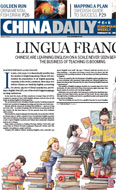Delicacies
A feast for the senses
Updated: 2011-02-26 07:40
By Raymond Zhou (China Daily)
|
Foie gras, deep-sea cod and beef are must-haves at Water Paradise Food & Coffee, in Suzhou. Raymond Zhou / China Daily |
|
Master chef Bob Song works his magic at the teppanyaki table. Raymond Zhou / China Daily |
Suzhou's most famous restaurant chain is known for its fine dining. Now you can get up close and personal with the gourmet chef over a sizzling grill, as Raymond Zhou finds out.
There is a subtle trade-off while dining at the newest addition to the epicurean paradise that is Suzhou.
Opened at the end of 2010, Water Paradise Food & Coffee's latest outlet is a sprawling 1,600-square-meter grand hall separated neatly into two parts - Chinese cuisine and Western food.
The jewel in this gastronomic crown is, nevertheless, an array of four private rooms devoted to teppanyaki.
As the teppanyaki rooms all face the front of the restaurant, where you can have an unimpeded view, through the French windows, of the ultra-modern business district with its gleaming towers, you'll have to give up an even more spectacular view of the expanse of water at the back.
At more than 700 hectares, Jinji (Golden Rooster) Lake is even larger than Hangzhou's famed West Lake, and has a riverside Ferris wheel to boot.
But if your sole interest is what goes into your mouth, you probably would not have much time for sightseeing anyway. Besides, the teppanyaki rooms offer plenty for your eyes as well.
A great advantage with teppanyaki is close proximity to your food and the person who prepares it. Bob Song, the master chef of teppanyaki at Water Paradise, is a young man with "old experience" as the Chinese call it. At 27, he has been showcasing his culinary skills for more than eight years. And it does not hurt that he is good-looking, too.
 |
Song can converse in simple English, having worked in Hong Kong for some time. A native of Hubei province and now a Hong Kong resident, he received his initial training from a Japanese master at Wuhan's Shangri-La Hotel. He not only shows you how the magic on the teppan is performed, but also why. When asked for the most crucial factor for good quality, he surprisingly puts the quality of the ingredients above cooking skills.
For example, the beef cubes with fried garlic are so tender they almost melt in your mouth. "You need fat with the beef," he explains, adding that the cattle are of a Japanese breed but raised in Australia. "They grew up listening to classical music."
Well, it's certainly reflected in the price, with a dinner for four costing as much as 2,000 yuan ($304) if you choose Australian beef, or 1,850 yuan for "special beef" and 2,780 yuan for "deluxe marbled beef". This is one out of a total of 10 courses, though. There are also menus for a la carte and another set for three people.
Depending on the size of your party, you can choose either a small room for six to eight or a larger one that can accommodate as many as a dozen. Sitting around a rectangle flat-surface grill of stainless steel, measuring 1.5 by 0.6 meters, you do not really see any fire as it is powered by electricity rather than gas.
However, a bluish flame, almost transparent like a phantom, does flicker in the bowl made from tin foil after Master Song lights up the sake inside. But when you drink the clam soup made out of it, there is not a trace of alcohol left. "It has been burned up, leaving only the delicious taste of seafood," he explains.
Teppanyaki may be a Japanese invention, but it has absorbed global influences. Water Paradise's foie gras and deep-sea cod offer a study of East-meets-West complement.
The foie gras, said to contain zero cholesterol, is simmered until it gets its special texture. And it is placed on top of a piece of apple, which, in turn, sits atop a slice of bread so that it does not look or taste oily. The cod has a golden and crispy surface, with a smattering of salt and pepper, but underneath it is still succulent.
Like all things Japanese, the cod and foie gras are bite-size, yet they are not supposed to be devoured in one bite. You'll need to nibble and savor it. Though the best cooking oil is used, Master Song is economical with it. "It's not healthy to have too much oily food. What I do is to bring out the oil inside the food itself. It's tastier this way."
Teppanyaki cooking is partly about showmanship. Processing the 100-gram prawn is both a challenge and a visual delight. Song first cuts off the head, and then with a knife in each hand picks out the "sand vein". It is done with such dexterity that you'll have to pay close attention or you'll never notice that actually the chef does not lay a finger on the prawn during the whole process. The removal of the vein is made possible by simply juggling the two knives.
Each chef has his or her own unique set of skills for showing off. Some can literally play with fire on the grill while others can perform more tricks with the knife. You'll have to juggle eating with watching.
But don't worry about not being able to catch up with the chef. Each course is served on a plate that sits on the 10-cm-wide ledge about 3 cm above the grill. The ledge is heated so the food won't become cold. However, the chef will remind you if a course is best consumed right away.
Next time you visit Suzhou, pamper yourself with a luxury dining experience at the most scenic venue of the city's famous restaurant franchise that is not only a feast for the eyes and the taste buds, but also a boost to your self-confidence as a bon vivant.
E-paper

Lingua franca
Chinese are learning English on a scale never seen before and the business of teaching is booming.
Preview of the coming issue
Golden run ahead
Looking abroad
Specials

NPC & CPPCC sessions
Lawmakers and political advisers gather in Beijing to discuss major issues.

Sentimental journey
Prince William and Kate Middleton returned to the place where they met and fell in love.

Rent your own island
Zhejiang Province charts plans to lease coastal islands for private investments


